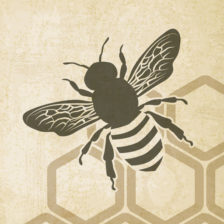The September 26, 2015 edition of the Apis Newsletter has been published. An excerpt below focuses on the New Zealand beekeeping industry and the story of manuka honey:
In my last issue of this newsletter, August 22, 2015, I reported on the efforts of Kiwimana.com in New Zealand to produce relevant podcasts to the beekeeping community. The one featuring Randy Oliver last month was significant, because it emphasized some of his philosophy in putting together his scientificbeekeeping.com web site.
Another popular podcast contribution that interviews Clif Van Eaton of New Zealand provides a good way to introduce beekeeping in that country to a wider audience. Mr. Van Eaton is the author of the book Manuka, The Biography Of An Extraordinary Honey,”based on work by Dr. Peter Molan. Mr. Van Eaton also is co-author of “Control of Varroa,” a downloadable .pdf file. I have just learned that Dr. Molan recently died, which will be felt widely by New Zealand beekeepers.
The podcast, about an hour in length, includes the Manuka honey story, also related in a recent radio broadcast. It was served as part ceremony witnessing the Treaty of Waitangi. Control Varroa in New Zealand as noted above, as well as the story of the first European honey bees to reach the country in 1839 is mentioned. Also hear the story of Kiwi fruit pollination and how honey bees are encouraged to forage on a plant that has no nectar! The manuka honey book is available from the usual outlets (Amazon.com), as well as the publisher; use the word “kiwimana” for a possible discount.
I was fortunate enough to visit New Zealand in 2007 after the Apimondia meeting in Australia. I found a vibrant industry at that time and it has only developed more it seems with the growth of interest in manuka honey. New Zealand has ahoney dew product that is unique. It also is a country optimistic about doing the difficult task of eliminating American foulbrood. And let’s not forget New Zealand’s vibrant queen rearing activities, often using the “cloake board” that was developed in that country.
With introduction of the Varroa mite, it appears the New Zealand apiculture (beekeeping) industry has been fragmented, leaving it without an effective voice to lobby the Government and unable to fund required research to push the industry into the future. This is about to change according to a recent article:
“Taupo was a pivotal moment for the industry. It signaled a coming of age, as delegates and supporters came together to celebrate all that is good about the industry and to lay down in broad terms a blueprint for the future.
“‘Conference 2015 will be remembered as the best yet, with over 830 registrations, a vast array of interesting topics, international speakers, educational workshops, practical learning and superb camaraderie’, said Federated Farmers Bee Industry Group Chairperson John Hartnell. The current dairy downturn is widely publicised, but what is not often recognised is the snowballing success of the apiculture industry in New Zealand based largely on the triumphs of the burgeoning manuka honey and bee-products industry.
“But like the runaway success the dairy industry was, success in the apiculture industry does not come without hurdles. Beekeepers will recall a time, in the not so distant past, where they needed to find a second job to make ends meet. Now many can afford to work for nine months and spend the rest of the year traveling and developing new business opportunities.
“The success of the manuka honey industry has seen a number of new players (individuals and companies) enter the apiculture industry. The industry’s success going forward is contingent on a strong, unified body which is able to support research projects beneficial to beekeepers, providing a powerful voice lobbying government and allowing the industry to effectively tackle key issues on biosecurity, disease control and food safety standards.”
U.S. beekeeping might benefit from New Zealand’s experiences. A somewhat parallel issue is the current fate of U.S. beekeepers, which seems far more problematic in the age of Colony Collapse Disorder (CCD) than extinction of the honey bee itself. Manuka honey appears to have helped New Zealand beekeeping in a number of ways. Many have also thought over the years that there seems to be little reason to have two national U.S. beekeeping associations, as was the case in New Zealand, but the situation continues in spite of a fine opportunity to mend industry fences in 1996.


